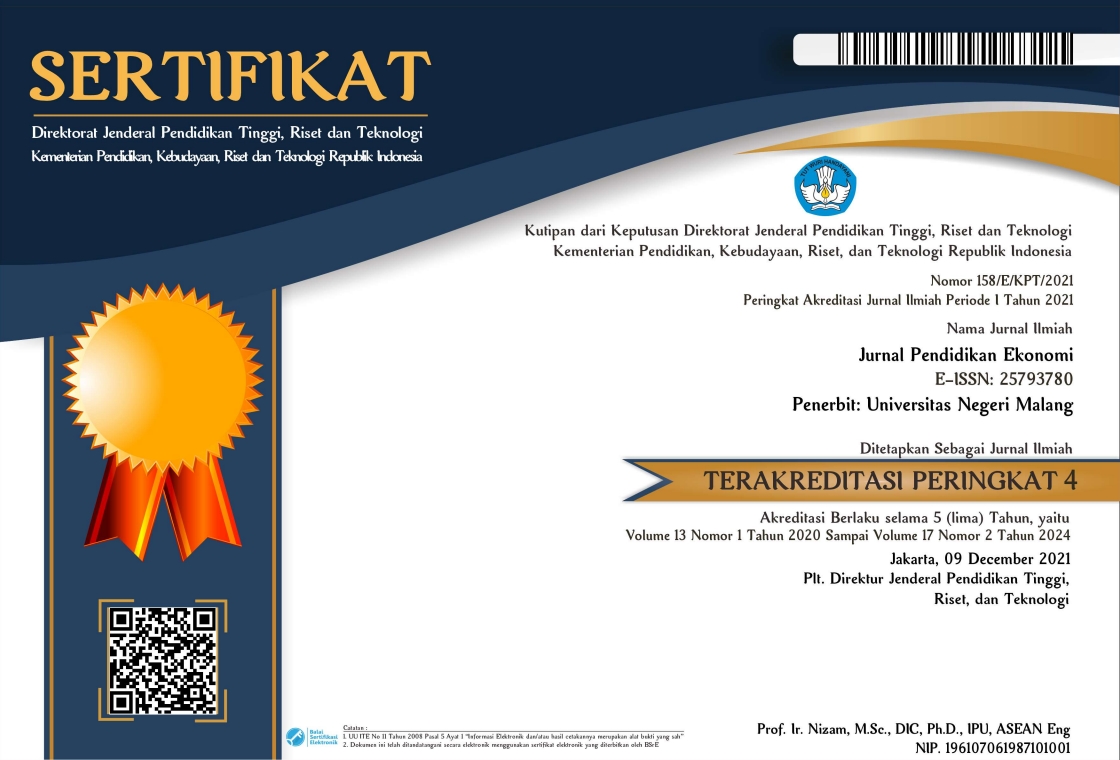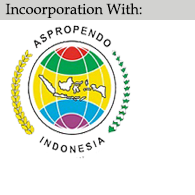PENGARUH LITERASI KEUANGAN, USIA, DAN BIMBINGAN ORANG TUA TERHADAP PENGELOLAAN UANG SAKU MAHASISWA UNINDRA
Abstract
The aim of this research to find the impact from financial literature, age, and parental guidance toward provision money. The type of this research is associative quantitative with using population amount which are 1229 students and 273 students from UNINDRA. Data gathering technique uses questionnaires that are already tested with viability and reliability test. Analysis technique uses double linear regression technique with SPSS 24.0 for windows operation system. The result shows 1) financial literature affects provision money management significantly, 2) age does not significantly affect the provision money management, 3) parental guidance does not affect the provision management, and 4) financial literature, age, and parental guidance affect the provision management significantly.
Keywords
Full Text:
PDFReferences
Ameliawati, M., & Setiyani, R. (2018). The Influence of Financial Attitude , Financial Socialization , and Financial Experience to Financial Management Behavior with Financial Literacy as the Mediation Variable. In International Conference on Economics, Business and Economic Education (pp. 811–832).
Baraja, A (2008) Psikologi Perkembangan: Tahapan dan Aspek-aspeknya. Jakarta: Studia Press.
Bamforth, J., & Geursen, G. M. (2014). Categorising the money management behaviour of young consumers. Young Consumers. [https://doi.org/https://doi.org/10.1108/YC-01-2017-00658]
Barnet-verzat, C., & Wolf, F.-C. (2008). Pocket money and child effort at school, 9(13), 1–10.
Bonke, J. (2013). Do Danish children and young people receive pocket money ?, (57).
Bucciol, A., Manfrè, M., & Veronesi, M. (2018). The role of financial literacy and mobey education on wealth decisions.
Bucciol, A., & Veronesi, M. (2014). Teaching children to save: What is the best strategy for lifetime savings? Journal of Economic Psychology, 45, 1–17. [Online, https://doi.org/http://dx.doi.org/10.1016/j.joep.2014.07.003]
Chotimah, C., & Rohayati, S. (2015). Pengaruh Pendidikan Keuangan Di Keluarga, Sosial Ekonomi Orang Tua, Pengetahuan Keuangan, Kecerdasan Spiritual, Dan Teman Sebaya Terhadap Manajemen Keuangan Pribadi Mahasiswa S1 Pendidikan Akuntansi Fakultas Ekonomi Universitas Negeri Surabaya.
Hadley, J. (2011) Mengelola Uang Saku. Jakarta: Pakar Raya
Ivancevich, John M., dkk (2006) Perilaku dan Manajemen Organisasi: Edisi Bahasa Indonesia. Jakarta: Penerbit Erlangga.
Kołodziej, S., Lato, K., & Szymańska, M. (2014). The Role Of Parental Influences On The Economic Socialization Of Children. Problems of Education in the 21st Century Volume, 58, 99-107.
Laily, N. (2013) Pengaruh literasi keuangan terhadap perilaku mahasiswa dalam mengelola keuangan.Journal Pendidikan Akuntansi. 1(4), 1-11
Megasari, I. R. (2017). Pembelajaran Pengelolaan Keuangan Orang Tua, Uang Saku, Dan Hasil Belajar Terhadap Literasi Keuangan Di SMK PGRI 3 Sidoarjo.
Otto, A. (2013). Saving in childhood and adolescence : Insights from developmental psychology. Economics of Education Review, 33, 8-18. https://doi.org/10.1016/j.econedurev.2012.09.005
Saravanan, S., & Devakinandini, V. (2014). A Study on Perception of College Students About Spending of Pocket Money With Reference To Students Studying in Arts & Science Colleges in Coimbatore. International Journal Of Marketing, Financial Services & Management Research, 3(3).
Sugiyono. (2016). Metode Penelitian Kuantitatif, Kualitatif, dan R&D. Bandung: Alfabeta.
Vhalery, R., Aimon, H., & Yulhendri. (2018). The Management of Student’s Pocket Money. International Journal of Scientific and Research Publications, 8(1), 10. Retrieved from www.ijsrp.org
Vhalery, R., Leksono, A. W., & Moh. Irvan. (2018). Factors that Influence the Allowance Management. International Journal of Scientific Engineering and Science, 2(11), 39–44. Retrieved from http://ijses.com/
Wang, H., & Hanna, S. (1997). Does Risk Tolerance Decrease With Age ?, (614), 27–32.
Refbacks
- There are currently no refbacks.

Jurnal Penddidikan Ekonomi is licensed under a Creative Commons Attribution-NonCommercial-ShareAlike 4.0 International License





